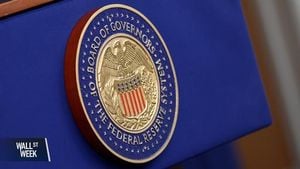South Carolina has executed Marion Bowman Jr. as part of the state’s renewed push to clear out its backlog of inmates awaiting executions. This marks the third execution since September, following years of delays attributable to drug shortages for lethal injections.
Bowman, 44, was administered lethal injection on January 31, 2025, for the 2001 murder of Kandee Martin, whose body was discovered burned and stuffed inside the trunk of her car.
Advocates and members of the public have gathered to protest these executions, raising concerns about the integrity of the justice system during events surrounding Bowman’s execution. He maintained his innocence throughout his incarceration, asserting he did not kill Martin.
Just before his execution, Bowman expressed remorse for Martin’s family, stating, "If my death brings them some relief and ability to focus on the good times and funny stories, then I guess it will have served a purpose. I hope they find peace." This sentiment reflects the complex emotions surrounding capital punishment, as supporters and critics alike grapple with its ethical ramifications.
South Carolina's decision to resume executions is largely driven by the state’s efforts to address the backlog of death row inmates who have exhausted their appeals. Legislative changes have facilitated access to lethal injection drugs, which had been scarce due to pharmaceutical companies' reluctance to be associated with capital punishment. The passage of the shield law allows the state to keep drug suppliers' identities confidential, paving the way for the use of pentobarbital.
Bowman's case highlights long-standing concerns within the criminal justice system, particularly issues surrounding legal representation and the fairness of trials. According to Lindsey S. Vann, the executive director of the inmate advocacy group Justice 360, "His conviction was based on unreliable, incentivized testimony from biased witnesses who received reduced or dropped sentences in exchange for their cooperation." These remarks shed light on the fundamental flaws within the judicial process, raising questions about the integrity of testimony obtained under duress or incentive.
The state has experienced significant fluctuations in its death row population. Since 2011, the number of inmates condemned to death has decreased from 63 to 30, attributed to successful appeals and natural causes among those previously on death row. Meanwhile, three other inmates await execution dates, as the South Carolina Supreme Court has issued rulings allowing executions to proceed at intervals of five weeks.
Bowman had spent over two decades on death row and was adamant about his innocence throughout his time there. He declined to seek clemency from Governor Henry McMaster, preferring not to spend what he deemed a wasted life on death row for crimes he claimed he did not commit. Despite his assertions, the state has historically maintained the death penalty without clemency being granted to any inmate.
South Carolina was once among the busiest states for capital punishment, conducting several executions annually. After encountering extensive delays and drug shortages, the state saw its previous 13-year moratorium on executions end when Bowman's execution was carried out. Prior to Bowman's death, the state executed Freddie Owens on September 20, 2024, and Richard Moore on November 1, 2024. Both executed inmates opted for lethal injection, but the state permits inmates to choose electrocution or execution by firing squad as alternate methods of death.
Echoing through the protests associated with Bowman's execution was the sentiment of those advocating for the abolition of the death penalty. Many of these groups argue against the morality of capital punishment itself, with one notable opposition leader stating, "These vigils are about showing people care, especially when it involves wrongful convictions and discrimination." Such claims point to deep-rooted issues within the legal system, reinforcing the necessity for reform and the urgent need to address disparities within capital trials.
Marion Bowman Jr.'s case and the state’s resumption of executions extend beyond individual actions; they exemplify the larger ethical debates prevalent within the American judicial system. With the first execution of 2025 now completed, South Carolina remains at the center of discussions on criminal justice reform and the future of the death penalty within the state and beyond.
Death penalty opponents are hopeful for continued advocacy aimed at reforming the system. Efforts are underway to raise awareness through vigils and publications, led by groups such as South Carolinians for Alternatives to the Death Penalty, emphasizing the need for compassion over capital punishment.
The dialogue surrounding capital punishment persists, and as executions resume, it continues to illuminate disparities and ethical dilemmas embedded within the judicial system. Whether such actions will lead to widespread reform or change remains to be seen, but the consequences of Bowman’s execution will undoubtedly reverberate throughout the state and beyond.



